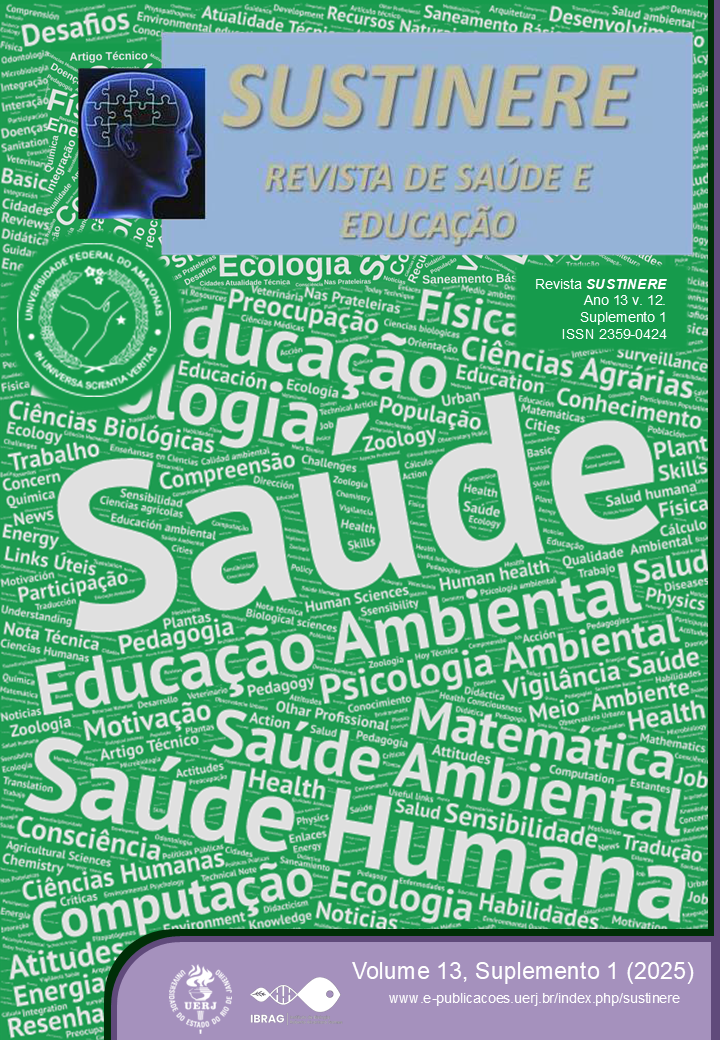Residência pedagógica e suas contribuições para formação docente: relato de experiência
DOI:
https://doi.org/10.12957/sustinere.2025.86902Palavras-chave:
Aprendizagem significativa, Formação docente, Habilidades pedagógicasResumo
A Residência Pedagógica é uma etapa fundamental na formação, proporcionando aos futuros docentes a oportunidade de vivenciar a prática educativa em ambiente escolar real. Nesse contexto, o presente relato de experiência destaca a importância dessa vivência para o desenvolvimento profissional. A abordagem qualitativa adotada permitiu uma imersão mais profunda nas práticas pedagógicas, possibilitando a reflexão sobre o processo de ensino e aprendizagem de forma mais ampla e significativa. Durante a residência pedagógica, pode-se conhecer a realidade da comunidade escolar, participar de atividades escolares, colaborar na elaboração de intervenções pedagógicas e integrar-se ao corpo docente. A elaboração de atividades diferenciadas, como a intervenção caça-tesouro e a participação em eventos escolares, demonstrou a importância de promover um ensino dinâmico e contextualizado, capaz de despertar o interesse dos alunos e favorecer a construção do conhecimento. A integração entre teoria e prática, aliada ao acompanhamento da preceptora e ao apoio da equipe escolar, proporcionou um ambiente propício para o desenvolvimento de habilidades pedagógicas e a consolidação da identidade profissional dos residentes. Em suma, a residência pedagógica se revelou como um espaço de aprendizagem enriquecedor, no qual os futuros professores puderam vivenciar desafios e conquistas, refletir sobre suas práticas e consolidar sua formação docente. A experiência adquirida durante esse período contribui significativamente para a construção de uma prática educativa mais reflexiva, contextualizada e eficaz.
Referências
ASSIS, R. M; BARROS, M. O; CARDOSO, N. S. Planejamento de Ensina: Alguns Sistematizações. Intinerario reflections, Goiás Vol I, n.4 ,2008.
COSTA, A. P da; PIMENTEL JÚNIOR, C. O programa residência pedagógica na formação docente: perspectivas de estudantes residentes em um subprojeto interdisciplinar de Biologia e Matemática. Educação Matemática Pesquisa v.24, n.4, p. 033-073, 2022.
FREITAS, M. C. de; DE FREITAS, B. M.; ALMEIDA, D. M. Residência pedagógica e sua contribuição na formação docente. Ensino em Perspectivas, Ceará, v. 1, n. 2, p.1-12, 2020.
FIALHO, W. C. G.; Santos, H. C. A. R. O Laboratório Escolar É Utilizado Em Aulas De Biologia No Ensino Médio?. Revista Cientifica Integrada, Guarujá, V. 5 – Edição 1 – 2021.
FONSECA, U. de J; LOPES, M. M. Avaliação Contínua da Aprendizagem como Indicador da Qualidade Educacional. ID on line. Revista Multidisciplinar e psicologia, v.12, n.41, p.1-15, 2018.
GASPAR, A; MONTEIRO, I. C. C. Atividades experimentais de demonstração em sala de aula: Uma análise segundo o referencial da teoria de Vygotsky. In: Investigações em Ensino de Ciências. v. 10, n. 2, p. 227-254, 2005.
GONÇALVES, M. J.; DOMINGUES, M. V.; KATO, D. S. A branquitude no discurso sobre desenvolvimento sustentável nos livros didáticos de Biologia. REnBIO-Revista De Ensino De Biologia Da SBEnBio, v.15, n.2, p. 1-19, 2022.
REIS, P. Observação de aulas e avaliação docente. Lisboa, Ministério da Educação, Conselho Científico para Avaliação de Professores, 2011.
SILVA, A. J. F. da; FERREIRA, J. S; BARROS, V. C; CRUZ, J. E; LIMA, J. F. S. de; LIMA, F. E.de S. A Importância das Intervenções Pedagógicas na Prática Docente: Um Olhar a Partir do Pibid Geografia/Uern-Assú. Revista GeoInterações, v.4, n.2, p.34-50, 2020.
SOARES, S de J. Pesquisa Científica: Uma abordagem sobre o método qualitativo. Revista Ciranda, v.1, n.3, p.168-180, 2019.
Downloads
Publicado
Como Citar
Edição
Seção
Licença
Copyright (c) 2025 Revista Sustinere

Este trabalho está licenciado sob uma licença Creative Commons Attribution 4.0 International License.
Os Direitos Autorais dos artigos publicados na Revista Sustinere pertencem ao(s) seu(s) respectivo(s) autor(es), com os direitos de primeira publicação cedidos à Revista SUSTINERE.
Os artigos publicados são de acesso público, de uso gratuito, com atribuição da autoria original obrigatória, de acordo com o modelo de licenciamento Creative Commons 4.0 adotado pela revista.

A Revista Sustinere está licenciada com uma Licença Creative Commons Atribuição 4.0 Internacional.






